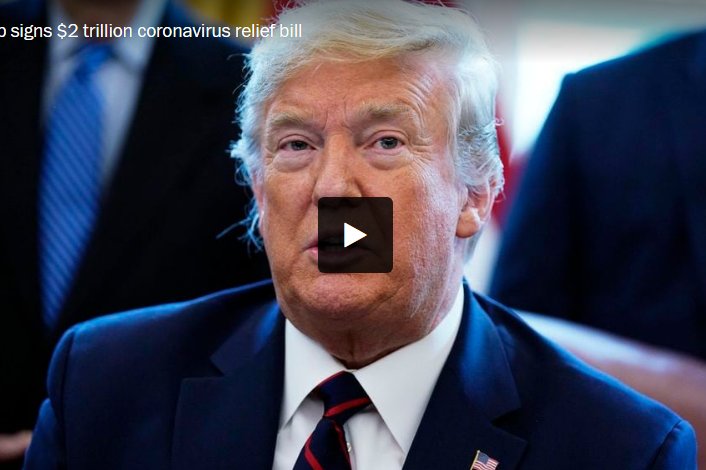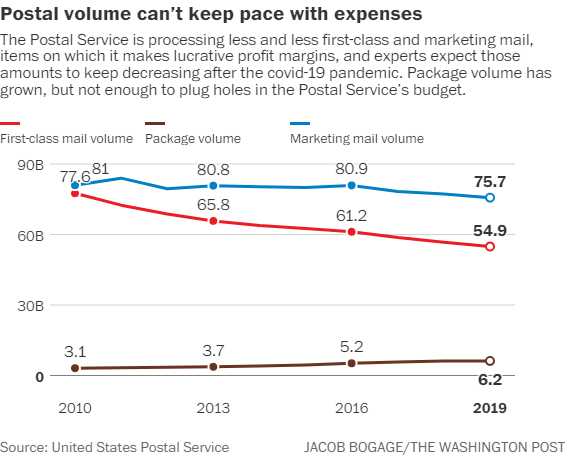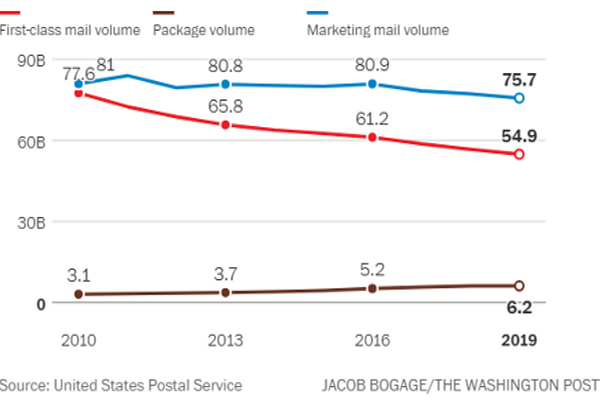
Date: 2024-12-21 Page is: DBtxt003.php txt00018657
Coronavirus
Impact on the Economy
White House rejects bailout for U.S. Postal Service battered by coronavirus ... The pandemic has pushed USPS to the brink, but Trump and Mnuchin shot down emergency aid
Peter Burgess

A U.S. Postal Service carrier wears a mask and gloves while making deliveries in Washington, D.C., on April 1. (Erik S Lesser/EPA-EFE/Shutterstock)
Through rain, sleet, hail, and even a pandemic, mail carriers serve every address in the United States, but the coronavirus crisis is shaking the foundation of the U.S. Postal Service in new and dire ways.
The Postal Service’s decades-long financial troubles have worsened dramatically, as the volume of the kind of mail that pays the agency’s bills — first-class and marketing mail — has withered during the pandemic. The USPS needs an infusion of money, and President Trump has blocked potential emergency funding for the agency that employs around 600,000 workers, repeating instead the false claim that higher rates for Internet shipping companies Amazon, FedEx and UPS would right the service’s budget.
Trump threatened to veto the $2 trillion Coronavirus Aid, Relief, and Economic Security Act, or Cares Act, if the legislation contained any money directed to bail out the postal agency, according to a senior Trump administration official and a congressional official who, like others in this report, spoke on the condition of anonymity.
“We told them very clearly that the president was not going to sign the bill if [money for the Postal Service] was in it,” the Trump administration official said. “I don’t know if we used the v-bomb, but the president was not going to sign it, and we told them that.”
Instead, Sens. Gary Peters (D-Mich.) and Ron Johnson (R-Wis.) added a last-minute $10 billion Treasury Department loan to the Cares Act to keep the agency on firmer ground through the spring of 2020, according to a Democratic committee aide.
Trump signs $2 trillion coronavirus relief bill

President Trump on March 27 signed into law a $2 trillion stimulus package, considered the largest economic relief in the nation’s history. (Reuters)
Lawmakers originally agreed to a $13 billion direct grant the Postal Service would not have to repay. That effort was blocked by Treasury Secretary Steven Mnuchin, who warned such a move could blow up the relief bill. A committee aide said Mnuchin told lawmakers during negotiations: “You can have a loan, or you can have nothing at all.”
Only the $10 billion loan to the Postal Service made it into law, over Mnuchin’s objections.
Without the loan, which awaits approval by the Treasury Department, the Postal Service would be “financially illiquid” by Sept. 30, according to estimates provided to lawmakers. Advocates for the Postal Service worry the agency is in a vulnerable position. As its main funding source dwindles, the Postal Service could be seen as ripe for a makeover; conservatives have long talked about privatizing the mail delivery in the United States.
The Postal Service projects it will lose $2 billion each month through the coronavirus recession while postal workers maintain the nationwide service of delivering essential mail and parcels, such as prescriptions, food and household necessities.
That work often comes at great personal risk. Nearly 500 postal workers have tested positive for the coronavirus and 462 others are presumptive positives, USPS leaders told lawmakers. Nineteen have died; more than 6,000 are in self-quarantine because of exposure.
While the Trump Administration and Mnuchin pushed through private-sector bailouts in the Cares Act — $350 billion to the Small Business Administration loan program, $29 billion to passenger airlines and air cargo carriers, and economic incentives for the construction, energy and life sciences industries, among others — Mnuchin has signaled any postal relief funds in a “Phase IV” stimulus package under negotiation would amount to a poison pill.
Postmaster General Megan Brennan asked lawmakers Thursday for another $50 billion — $25 billion to offset lost revenue from declining mail volume due to the coronavirus and $25 billion for “modernization” — plus another $25 billion Treasury loan and a mechanism to pay down $14 billion in existing public debt.
Postmaster general who was target of Trump’s ire announces retirement
House Democrats, led by Rep. Gerald E. Connolly (Va.), cautioned that without the funding, the Postal Service may not make it past September without missing payrolls or service interruptions. Senate Republicans insist the $10 billion loan from the Cares Act provided sufficient short-term liquidity, the staffer said, and the Senate would not vote to extend more money to an agency unlikely to make good on its borrowing.
“I’m so frustrated at how difficult it has been for a long time to galvanize attention and action around an essential service,” Connolly said in a phone interview. “And maybe the pandemic forces us all to refocus on this service and how essential it is and how we need to fix it while we can before it gets into critical condition.”

Amazon says it will hire 100,000 workers as coronavirus sparks rise in online orders
Amazon announced on March 17 that it would hire 100,000 workers to manage surge in orders, as many people turn online for goods during the coronavirus outbreak. (Reuters) Trump has long been antagonistic of the post office, calling it once in a tweet Amazon’s “delivery boy.” The Postal Service often serves as a vendor for Amazon, UPS, FedEx and other shipping companies, delivering the “last mile” service to often rural and remote areas. It is a crucial service for the Postal Service, for which package delivery is a growing part of its business.
Trump personally pushed postmaster general to double rates on Amazon, other firms
Much of Trump’s invective on the Postal Service is aimed at Amazon founder and chief executive Jeff Bezos, who owns The Washington Post. Trump has advocated for increasing the prices on Amazon deliveries, against the recommendation of shipping experts and the agency’s own Board of Governors, a majority of whom Trump appointed.
“They should raise, they have to raise the prices to these companies that walk in and drop thousands of packages on the floor of the post office and say, ‘Deliver it,'' Trump said at a news conference Wednesday. “And they make money, but the post office gets killed. Okay? So they ought to do that, and we are looking into it, and we’ve been pushing them now for over a year.'
Raising rates too much would lead private-sector competitors to develop their own cheaper methods to deliver packages, said Lori Rectanus, director of physical infrastructure at the Government Accountability Office. Even if a rate increase generates revenue, that money would be marginal to the total Postal Service debt, almost all of which comes from a congressional requirement to prepay pension and retiree health care costs for all employees, even those who haven’t yet retired.
Under normal market conditions, the Postal Service nearly breaks even, save for the pension account debt, despite cratering volume on deliveries in recent years. In 2010, it delivered 77.6 billion items of first-class mail. In 2019, it delivered only 54.9 billion first-class items. The service handled 3.1 billion packages in 2010 and 6.2 billion in 2019, although processing packages doesn’t earn the agency as much revenue as first-class mail delivery.



The coronavirus has completely upended consumer behavior and the quantity of items in the mail. Volume in the first week of March declined 30 percent, postal agency officials told lawmakers. At the end of June, the agency projects volume to be down 50 percent, and it could lose $23 billion over the next 18 months.
“We are at a critical juncture in the life of the Postal Service,” Brennan, the postmaster general, said in a statement. “At a time when America needs the Postal Service more than ever, the reason we are so needed is having a devastating effect on our business.”
The Postal Service has faced financial troubles for more than a decade, as digital communication morphed and took off, giving lawmakers many opportunities to debate its future. The Postal Service is so foundational to the country that it is enumerated in the Constitution.
The agency’s troubles have renewed conservative conversations about structural changes that would force the Postal Service to act more like a corporation, with steps such as eliminating the prepaid pension requirement and easing its universal service obligation to deliver to every address in the United States, including ones so remote.
“If we’re concerned about the Postal Service and its workers,” said Romina Boccia, an economist at the right-leaning Heritage Foundation, “the best thing we can do is to free up the Postal Service to operate like a business so they can try to get back into the black.”
Josh Dawsey and Jeff Stein contributed to this report.
-----------------------------------------------------------
What you need to know about coronavirus Coronavirus: What you need to read The Washington Post is providing some coronavirus coverage free, including:
Updated April 11, 2020 Live updates: The latest in the U.S. and abroad
Mapping the spread: Cases and deaths in the U.S. | Map of cases worldwide
More stories today: As tornado outbreak looms, meteorologists say to put shelter above coronavirus concerns | IRS is launching a new online tool for people to track their stimulus checks
What you need to know: How to make your own fabric mask | What to do if you get laid off or furloughed | Stay-at-home orders by state | Calculate how much money you might receive from the stimulus bill | Follow all of our coronavirus coverage and sign up for our daily newsletter.
How to help: Your community | Seniors | Restaurants | Keep at-risk people in mind
Jacob Bogage Jacob Bogage writes about sports for The Post, where he has worked since 2015. He previously covered the automotive and manufacturing industries for the Business section.Follow
A plan to defeat coronavirus finally emerges, but it’s not from the White House